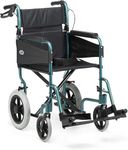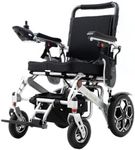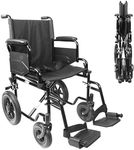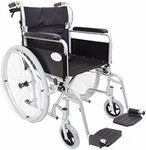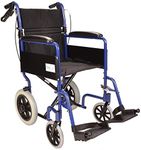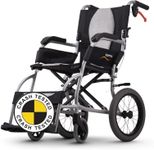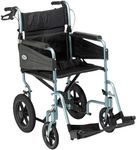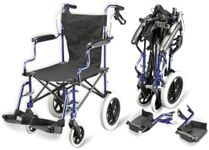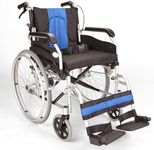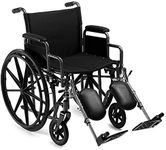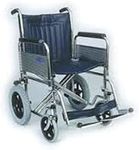Buying Guide for the Best Folding Wheelchairs
Choosing the right folding wheelchair is crucial for ensuring comfort, mobility, and independence. When selecting a folding wheelchair, it's important to consider various specifications that will affect the usability and suitability of the wheelchair for your specific needs. Understanding these key specs will help you make an informed decision and find the best fit for you.WeightThe weight of the wheelchair is important because it affects how easy it is to transport and maneuver. Lightweight wheelchairs are easier to lift into a car and push, making them ideal for active users who travel frequently. Heavier wheelchairs may offer more stability and durability, which can be beneficial for users who need a more robust chair for daily use. Consider your lifestyle and how often you will need to transport the wheelchair when deciding on the weight.
Seat WidthSeat width is a critical factor for comfort and support. It refers to the distance between the armrests and should be wide enough to accommodate the user comfortably without being too tight or too loose. Standard seat widths range from 16 to 20 inches. A seat that is too narrow can cause discomfort and pressure sores, while a seat that is too wide can make it difficult to maneuver the wheelchair. Measure your hips and add a couple of inches to determine the appropriate seat width for you.
Weight CapacityWeight capacity indicates the maximum weight the wheelchair can safely support. This is important for ensuring the durability and safety of the wheelchair. Standard wheelchairs typically support up to 250 pounds, while heavy-duty models can support up to 500 pounds. Choose a wheelchair with a weight capacity that exceeds your body weight to ensure it can handle your needs without compromising performance.
FoldabilityFoldability refers to how easily the wheelchair can be folded and stored. This is particularly important for users who need to transport the wheelchair frequently or have limited storage space. Some wheelchairs fold more compactly than others, making them easier to fit into car trunks or small storage areas. Consider how often you will need to fold and store the wheelchair and choose a model that meets your convenience needs.
Wheel TypeThe type of wheels on a wheelchair affects its performance on different surfaces. There are two main types: solid and pneumatic (air-filled) wheels. Solid wheels are maintenance-free and work well on smooth surfaces, while pneumatic wheels provide a smoother ride on uneven terrain but require more maintenance. Think about where you will be using the wheelchair most often and choose the wheel type that best suits those environments.
AdjustabilityAdjustability features, such as adjustable armrests, footrests, and backrests, can greatly enhance comfort and usability. These features allow you to customize the wheelchair to fit your body and preferences. If you have specific needs or anticipate spending long periods in the wheelchair, look for models with multiple adjustability options to ensure maximum comfort and support.
CushioningCushioning is important for comfort and pressure relief, especially if you will be sitting in the wheelchair for extended periods. Different types of cushions, such as foam, gel, or air, offer varying levels of support and pressure distribution. Consider your comfort needs and any medical conditions that may require special cushioning when selecting a wheelchair.
